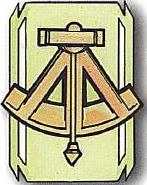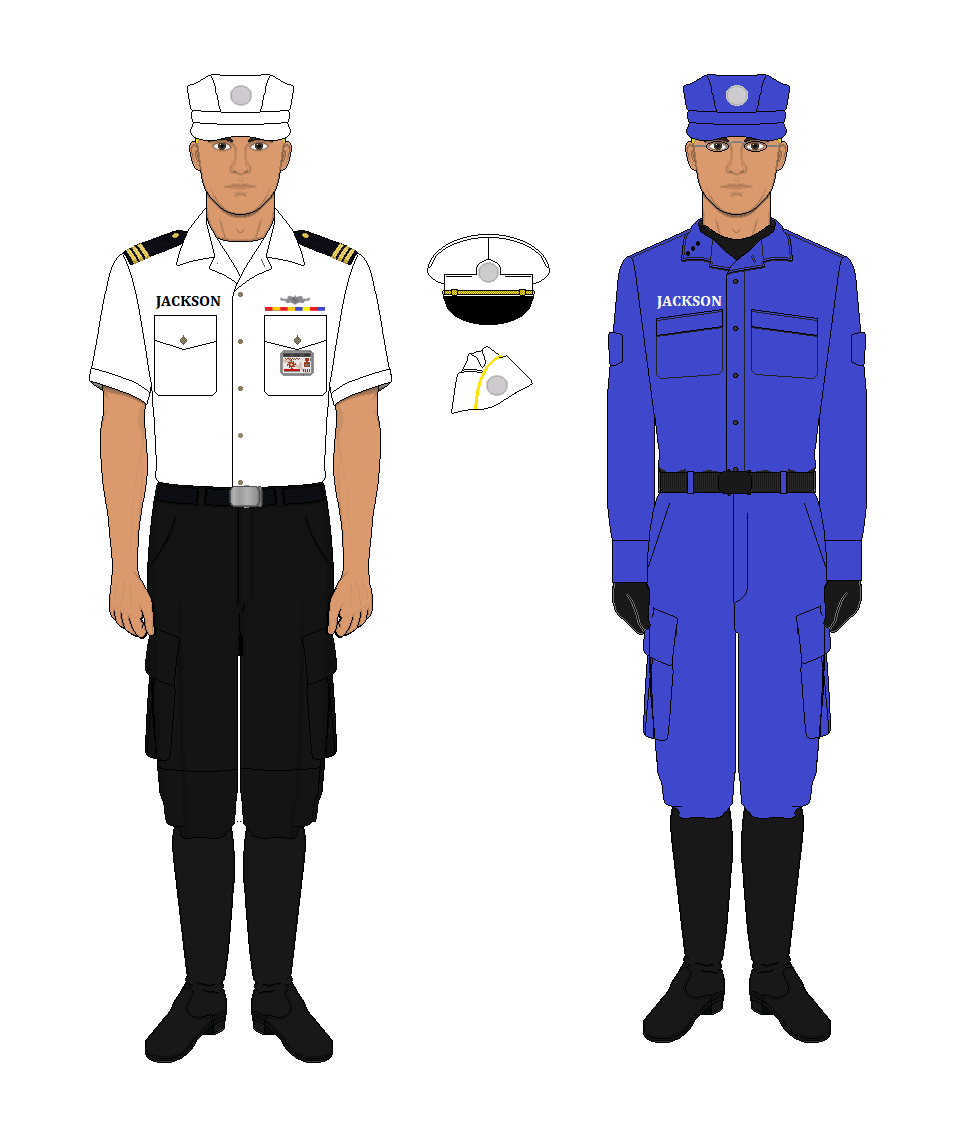 | | Merchant Marine Shield. |
|---|
The UGC Merchant Marine is the fleet of merchant vessels that are registered to the Council. Spacefarers on merchant vessels are required by the Commission On Standards Training, Certification And Watchkeeping for Spacefarers to carry Merchant Mariner's Licenses equal to the billet on board that they are filling, with a "1 Up" allowance that allows them to fill a billet one license level higher under proper supervision.Through Terra's history, various nations had established a maritime fleet and regulatory bodies to ensure that the men serving said fleets were competent to their duties, namely to get the ship from point A to point B with cargo intact, and to regulate the ships to ensure they were physically capable of doing so. The Plenipotentiary Council continued this tradition after the Third and Fourth Robotech Wars, starting around 2050 by issuing the first licenses for civilian-owned ships; This event would remain controversial for decades, as the ships were REF cargo ships, and the crews were very recently discharged REF personnel, with the allegation that the testing completed was inadequate. Testing standards have risen steadily since then.Licenses.There are many types of licenses reflecting greater and greater importance; There are also two lines of licenses, Deck Officers and Engineering Officers, and while one does not require the opposite licenses, few Deck Officers fail to get at least one grade lower Engineer Officer's licenses, while the unwritten rule is an Engineer must have at least a Navigator's License for one Class below their own license class. Under Force Majeure, the engineers of a ship can take command if any one of them holds at least a Deck License for the purposes of entering the first safe harbor; A Deck Officer holding the appropriate Engineer's Licenses can take a tool to the engines for the purpose of effecting bare minimum repairs necessary to enter the nearest safe harbor. However, anyone with the appropriate license on both sides (both by type and tonnage, with equipment certification) can perform both sets of duties, without hazard.Licenses follow both duties, Deck or Engineer, and Rating, by tonnage; A Master rated to 21 million tons will be able to command any ship likely to be built in the next thousand years, but a Master rated to 20,000 tons can only command a vessel up to 20,000 tons in weight. A Chief Engineer follows the same principles.A second category of licensure is Equipment Certification; A hypothetical Captain rated to 21 million tons may not necessarily have the Certification for a Sojourner-Class cargo ship, so while they could command a vessel that big, they can't actually command a Sojourner-Class until they have the certification. Likewise, Engineers must have the certification to the equipment they intend to sail on.A common exemption is made for each part for "1 Up" and "Practical Factors." "1 Up" allows a licence holder to work on a vsl 1 category higher than their certification, while Practical Factors allows an individual who is not rated or certified to sail on a ship to get their hands-on time towards said rating/certification, under proper supervision. Many Third Officers have sailed as acting Second Officers under the supervisor of a Captain; Only an Acting Captain and Acting Chief Engineer may not sail without a Captain/Chief Engineer on board.Deck Licenses.Captain's License: A Captain is in ultimate command of the vessel, responsible for its safe and efficient operation, including cargo operations, navigation, crew management and ensuring that the vessel complies with local and international laws, as well as company and UGC policies. All persons on board, including officers and crew, other shipboard staff members, passengers, guests and pilots, are under the captain's authority and are his ultimate responsibility.First Officer: A First Officer ("First") is the head of the deck department, a watchstander, and in charge of the ship's cargo and crew. The First Officer is responsible to the Captain for the safety and security of the ship, include the crew's welfare, training in areas such as safety, firefighting, search and rescue, etc., and on occasion for discipline. Informally referred to as the XO, a holdover from the Spacy and SPAES's custom of referring to the second in command as the Executive Officer. Second Officer: A Second Officer is third in command and a watchkeeping officer, as well as the ship's navigator, medical officer or other specific duty officers.On many ship, the Chief Engineer hold a Second Officer's Licenses.Third Officer: A Third Officer is a watchstander and safety officer of a department of a merchant ship. They handle the day-to-day operations of their department, such as Galley, Medical, Engineering, etc. while the Second Officer ensures they are in fact doing so.Engineers:Chief Engineer: A licensed spacer in charge of the engineering department on a merchant vessel. "Chief Engineer" is the official title of someone qualified to oversee the entire engine department.A Chief Engineer (commonly referred to as "Chief") is responsible for all operations and maintenance that has to do with any and all engineering equipment throughout the entire ship. The Chief Engineer is of equal rank to the Captain, but is restricted to the engineering department. Most Chief Engineers hold at least a Second Class license in the event there should be any issues with the ship's command staff. The Chief Engineer also determines the fuel, oil, and other engineering consumables required, spare parts inventory, transfer of fuel and oil, and is in charge of the engine room during emergencies.First Engineer: A First Engineer is the person on a ship responsible for supervising the daily maintenance and operation of the engine department. They report directly to the Chief Engineer.Second Engineer: A Second Engineer is responsible for individual systems of the engineering plant, such as refrigeration systems, powerplant, drive system, etc. They are typically the busiest engineer aboard the ship due to the nature of their duties. The Second Engineer is typically stands the 0600-1200 watch in their section, but is also the one who sets watch rotation.Third Engineer: A Third Engineer is the Watch engineers, standing 1200-1800, 1800-0000, or 0000-0600 watch for their section. Under them would be assigned the Engineer Mates.Non-Licensed Duties: There are many positions to which a full license is not required, Boatswain's Mate: A Boatswain's Mate is the most senior among the deck ratings. The boatswain is responsible for all deck works which includes ship maintenance, and repair of deck equipment, loading and discharge of cargo and passengers, mooring details, and underway helmsmen and lookouts.Engineer Mate: An Engineer's Mate is the most senior among the engineer ratings. The Engineer's Mate is responsible for all engineering works which includes maintaining the engine's while underway and repairing them as needed. It is illegal to take a tool to an engine "on load" (that is, a running engine), and as such an Engineers' Mate must inform the Third Engineer on duty of any issues with the engines while they are operating; It is the Third Engineer's decision whether to request to secure the engine or not, and the Deck Officer's decision whether or not to grant the request (most Deck Officers will grant the permission, but there have been occasions when this request was denied). An Engineer's Mate is typically a Third Engineer in training, and as such may possess a Third Engineer Conditional license.Spacer In the modern merchant marine, a Spacer is a member of a department and must possess a Spacer's License; However, a Spacer's License reflects only that they can identify rank insignias and use the Rescue And Recovery equipment, and not any technical training.Spacer Apprentice In the UGC Merchant Marine, an Spacer Apprentice is an entry-level position in a ship's deck department. An SA performs a variety of duties concerned with the operation and upkeep of deck department areas and equipment. Upkeep duties include scaling, buffing, and painting decks and superstructure; as well as sweeping and washing the deck. An SA may splice wire and rope; break out, rig, overhaul, and stow cargo-handling gear, stationary rigging, and running gear. Additionally, the SA secures cargo, as well as launches and recovers boats. The SA may rig and operate hydrographic and other specialty winches; handle and stow oceanographic explosives; and stage and stow beach support equipment.Assigned Duties (Certification)The Navigator's role focuses on creating the ship's passage plans. A passage plan is a comprehensive, step by step description of how the voyage is to proceed from berth to berth or you say One port to another. The plan includes undocking, departure, the en route portion of a voyage, approach, and mooring at the destination.Medical crewGalley crew: Cooks and messcooks. Spacers may be assigned to the galley crew.Engineering crew: Simply Spacers assigned to the Engineering Section of the ship.General Information:Name: UGC Merchant Marines.Director: The Merchant Marines Fleet Officers (equivalent in duties to a Spacy or SPAES Admiral) report to the SPAES Office Of Merchants Shipping and to their corporate Executive Officers.This dual-reporting standing can create issues for the ship's captains, and on occasion the corporations and SPAES have had to square off over regulatory matters; In more than one case, the SPAES paid for a ships' captains legal fees in full to defend them against a corporate action for failure to meet company expectations by obeying UGC law; When this fails, the SPAES usually opens an Shipping Interests investigation into the shipping concern itself, a process that can cost the company millions, even billions, in lost profits, which is a hassle they don't usually want, and tend to reinstate the Captains.Duties: Oversee the shipping and training of shipping crews.Size and Orientation: Super Agency (200).Features: |



